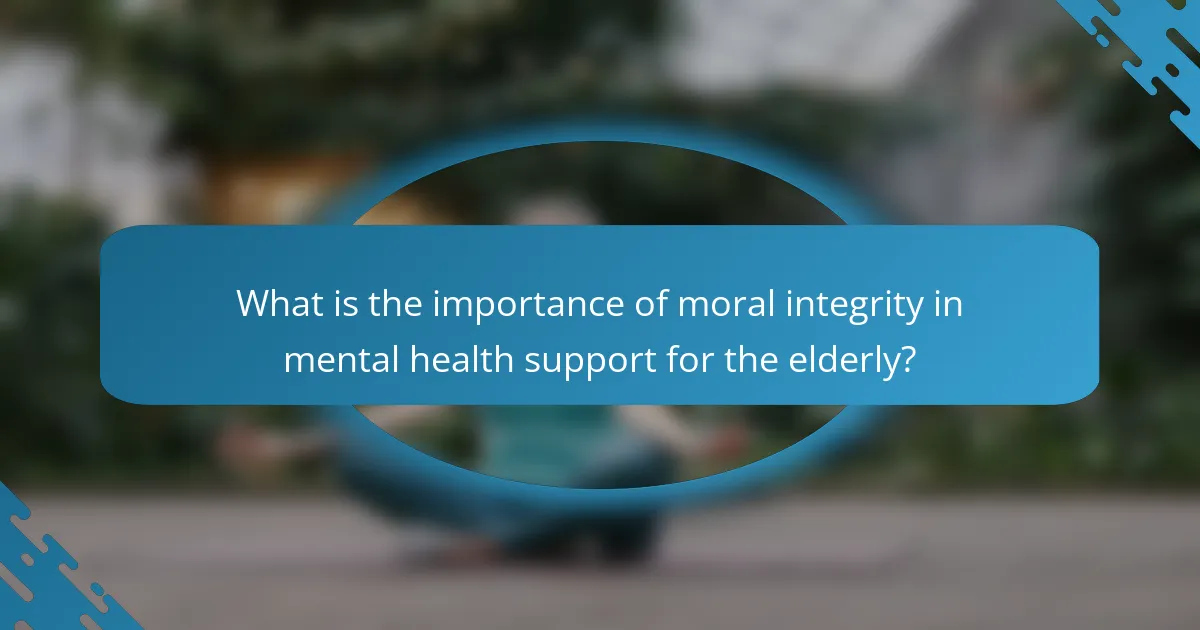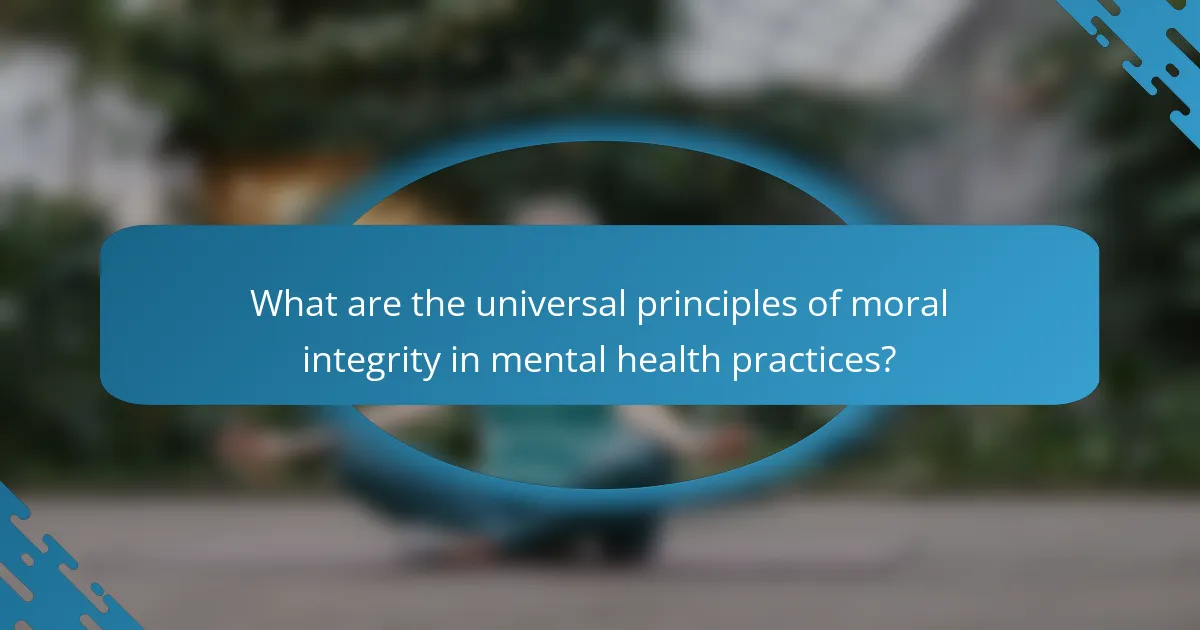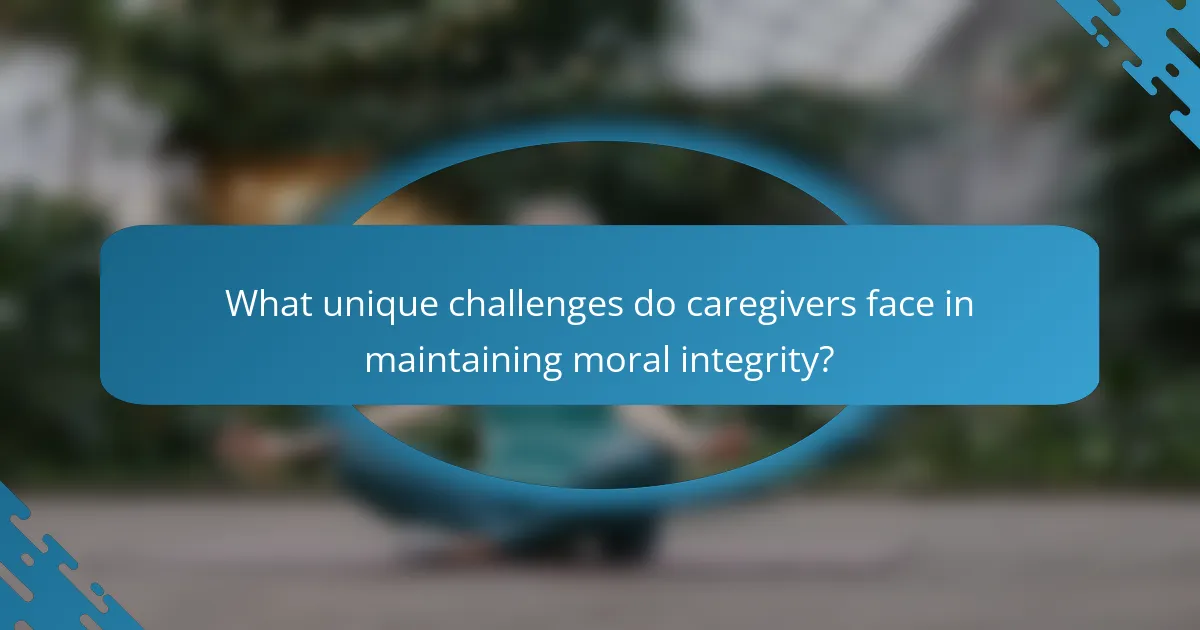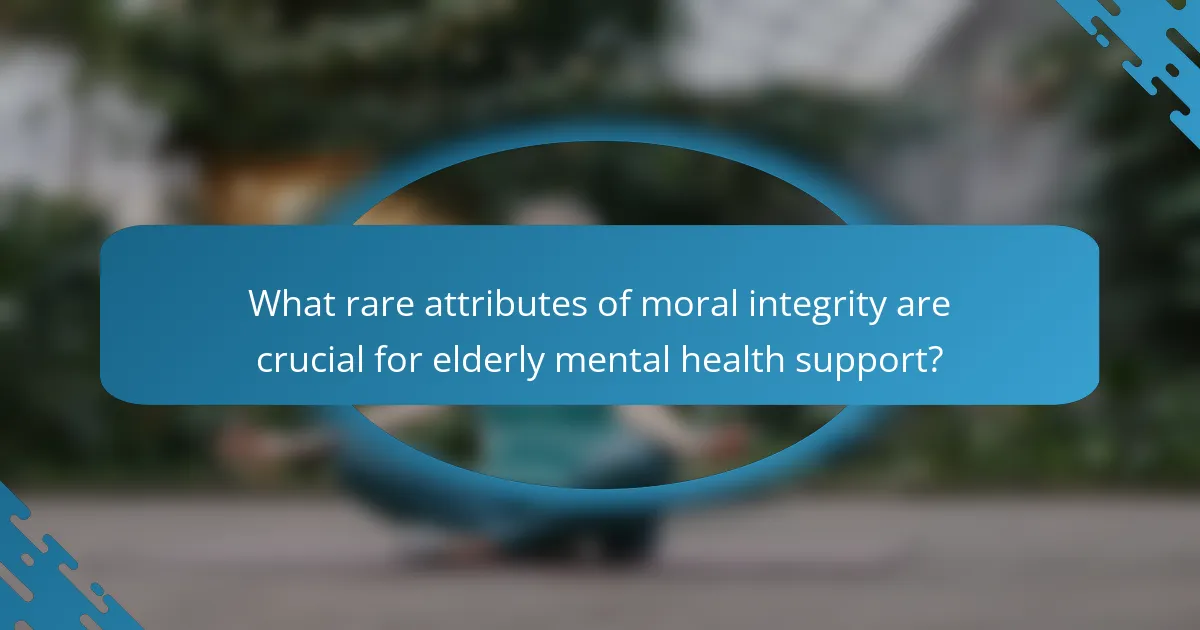Moral integrity in mental health support is essential for empowering the elderly with compassion and respect. It fosters trust and enhances communication, leading to improved emotional stability. Caregivers face challenges in maintaining these values due to ethical dilemmas and burnout. Prioritising ethical practices and active listening can create a supportive environment that honours the dignity of older adults.

What is the importance of moral integrity in mental health support for the elderly?
Moral integrity is crucial in mental health support for the elderly as it fosters trust, respect, and dignity. Upholding moral integrity ensures that caregivers prioritise the well-being of elderly individuals, promoting their emotional stability and quality of life. This integrity leads to better communication, encouraging seniors to express their feelings and needs openly. As a result, mental health interventions become more effective, addressing specific issues with compassion. Furthermore, moral integrity enhances the overall therapeutic relationship, empowering the elderly to engage actively in their mental health journey.
How does compassion enhance the mental health of elderly individuals?
Compassion significantly enhances the mental health of elderly individuals by fostering emotional connections and reducing feelings of isolation. It promotes a sense of belonging, leading to improved mood and well-being. Studies indicate that compassionate interactions can lower anxiety and depression rates among older adults. Additionally, compassion encourages social engagement, which is vital for cognitive health. By treating the elderly with respect and empathy, caregivers can empower them to maintain dignity and self-worth, ultimately contributing to their overall mental resilience.
In what ways does respect contribute to effective mental health support?
Respect significantly enhances effective mental health support by fostering trust and promoting open communication. When mental health professionals treat elderly clients with dignity, it encourages them to share their experiences and feelings. This openness leads to more accurate assessments and tailored interventions. Furthermore, respect validates the elderly’s life experiences, reinforcing their self-worth and encouraging their active participation in their own care. As a result, the overall effectiveness of mental health support improves, leading to better outcomes for elderly individuals.

What are the universal principles of moral integrity in mental health practices?
Moral integrity in mental health practices emphasizes compassion and respect for the elderly. Core principles include confidentiality, informed consent, and respect for autonomy. These principles foster trust and enhance the therapeutic relationship. Adhering to these values ensures that elderly individuals receive care that honours their dignity and personal choices.
How do ethical guidelines shape mental health support for the elderly?
Ethical guidelines are crucial in shaping mental health support for the elderly by ensuring their dignity and autonomy are prioritized. These guidelines promote compassionate care, respect for individual rights, and informed consent, which empower the elderly in their treatment decisions. As a result, mental health professionals are better equipped to provide personalized support that acknowledges the unique experiences and needs of older adults. This approach fosters trust and enhances the overall effectiveness of mental health interventions.
What role does empathy play in fostering trust between caregivers and elderly clients?
Empathy is crucial in building trust between caregivers and elderly clients. It fosters open communication, encourages emotional connection, and enhances the overall care experience. Caregivers who demonstrate empathy are more likely to understand the unique needs and preferences of elderly clients, which leads to improved satisfaction and cooperation. This emotional bond can significantly reduce feelings of isolation and anxiety in elderly individuals, promoting a sense of security and well-being. Empathy also encourages caregivers to respect the dignity of their clients, reinforcing moral integrity in mental health support.

What unique challenges do caregivers face in maintaining moral integrity?
Caregivers face unique challenges in maintaining moral integrity due to emotional strain and ethical dilemmas. Balancing compassion with professional boundaries can lead to conflicts in decision-making. High demands may result in burnout, impacting their ability to provide respectful support. Additionally, navigating family expectations complicates their moral responsibilities. Understanding these factors is crucial for enhancing caregiver support systems.
How can caregivers balance professional boundaries with compassionate care?
Caregivers can balance professional boundaries with compassionate care by establishing clear limits while fostering emotional connections. This approach enhances trust and respect, essential for effective mental health support.
Setting boundaries helps prevent burnout and maintains a professional relationship. Caregivers should communicate openly about their roles and responsibilities, ensuring elderly clients understand the nature of their support.
Compassionate care involves active listening and empathy, allowing caregivers to respond to emotional needs without compromising their professional stance. Regular training on ethical practices can reinforce this balance, ensuring caregivers remain effective while providing heartfelt support.
Ultimately, the goal is to empower the elderly with dignity and respect, creating a supportive environment that honours both professional integrity and compassionate care.
What strategies can be employed to navigate ethical dilemmas in elderly support?
To navigate ethical dilemmas in elderly support, prioritize clear communication, compassion, and respect for autonomy. Establish a framework for decision-making that includes stakeholder involvement and ethical guidelines. Regular training on ethical standards enhances staff awareness and responsiveness. Utilize case studies to illustrate complex scenarios, fostering critical thinking and collaborative solutions.

What rare attributes of moral integrity are crucial for elderly mental health support?
Compassion, empathy, and respect are rare attributes of moral integrity crucial for elderly mental health support. These qualities foster trust and enhance the emotional well-being of older adults. Compassionate interactions reduce feelings of isolation, while empathy allows caregivers to understand and address unique emotional needs. Respecting the dignity and autonomy of the elderly promotes a sense of worth, which is essential for mental health. Collectively, these attributes create a supportive environment that empowers the elderly, improving their overall mental health outcomes.
How does cultural sensitivity enhance moral integrity in mental health care?
Cultural sensitivity enhances moral integrity in mental health care by fostering trust and understanding. It ensures that elderly patients feel respected and valued, leading to better engagement in their care. This approach reduces stigma and promotes open communication, which is critical for effective treatment. By acknowledging diverse backgrounds, mental health professionals can tailor their support to meet unique needs, ultimately enhancing patient outcomes.
What is the impact of intergenerational communication on mental health support?
Intergenerational communication significantly enhances mental health support for the elderly by fostering understanding and connection. This approach promotes empathy, reduces feelings of isolation, and encourages the sharing of wisdom. Studies indicate that older adults who engage in meaningful conversations experience improved emotional well-being. By empowering the elderly with compassion and respect, mental health support systems can create a more inclusive environment that values their contributions. This unique attribute of intergenerational interaction not only benefits the elderly but also enriches younger generations, creating a cycle of mutual support.

What are the best practices for implementing moral integrity in mental health support?
To implement moral integrity in mental health support for the elderly, prioritize compassion, respect, and ethical practices. Establish clear guidelines that promote dignity, confidentiality, and informed consent. Engage in active listening to understand individual needs and preferences. Foster an environment of trust through consistent communication and transparency. Regular training for caregivers on ethical standards enhances service quality and accountability.
How can caregivers develop skills for compassionate communication?
Caregivers can develop skills for compassionate communication through training, practice, and self-reflection. Engaging in active listening enhances understanding and fosters trust. Role-playing scenarios can improve empathy and response to emotional cues. Continuous education on mental health issues empowers caregivers to address the unique needs of the elderly. Regular feedback from peers and supervisors helps refine communication techniques and promotes moral integrity in support.
What common mistakes should be avoided to uphold moral integrity?
To uphold moral integrity in mental health support for the elderly, avoid common mistakes such as lack of empathy, dismissing their concerns, and failing to respect their autonomy. Prioritise active listening and validate their feelings. Ensure transparency in communication about treatment options. Avoid making assumptions about their capabilities or needs, as this can undermine their dignity. Lastly, refrain from imposing personal beliefs, which can compromise the trust essential for effective support.
What are the key elements of effective training programs for caregivers?
Effective training programs for caregivers emphasize moral integrity, compassion, and respect towards the elderly. Key elements include comprehensive curriculum design, ongoing support, and assessment methods that focus on empathy.
Training should encompass ethical decision-making, communication skills, and understanding the unique needs of elderly individuals. Incorporating real-life scenarios enhances learning and retention. Regular feedback mechanisms ensure caregivers can continually improve their approach.
Furthermore, fostering a supportive community among caregivers encourages sharing of experiences and best practices. This collaborative environment strengthens the overall quality of care provided.
Lastly, evaluating the impact of training through measurable outcomes can highlight areas for improvement and reinforce the importance of moral integrity in mental health support.
How can ongoing supervision improve ethical practices in elderly care?
Ongoing supervision significantly enhances ethical practices in elderly care by ensuring accountability and adherence to standards. Regular oversight fosters a culture of moral integrity, promoting compassion and respect among caregivers. It allows for timely identification of ethical dilemmas and provides a platform for continuous training. This proactive approach leads to improved decision-making and better outcomes for the elderly. Ultimately, consistent supervision cultivates an environment where ethical considerations are prioritized, benefiting both caregivers and those they support.
What resources are available for caregivers to enhance their understanding of moral integrity?
Caregivers can access various resources to enhance their understanding of moral integrity in mental health support. Educational workshops offer insights into ethical practices. Online courses provide flexible learning on compassion and respect. Support groups foster discussions on moral dilemmas faced in caregiving. Books and articles serve as valuable references for ethical frameworks. Professional organizations often publish guidelines to navigate complex situations. These resources collectively empower caregivers to uphold moral integrity while supporting the elderly.
How can community engagement support moral integrity in mental health initiatives?
Community engagement fosters moral integrity in mental health initiatives by promoting empathy and understanding. Involving the elderly in decision-making enhances respect and dignity, ensuring their voices are heard. Programs that include community input lead to tailored support, addressing unique needs effectively. As a result, initiatives become more compassionate, reinforcing ethical standards in mental health care.